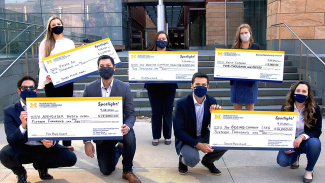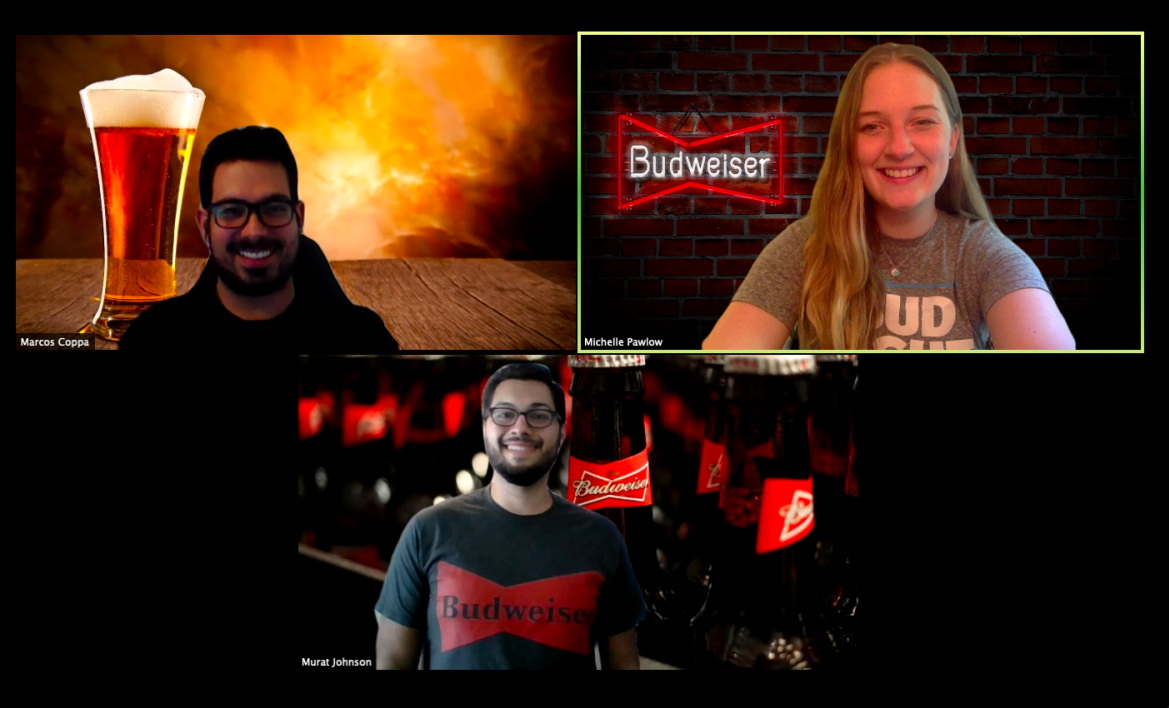Michigan Ross MBAs Take First Place in this Year’s Annual Tauber Institute Spotlight! Event

Full-Time MBA students from the Ross School of Business were among the winners of the Tauber Institute for Global Operations' 2020 Spotlight! Team Project Showcase and Scholarship Competition, which was held virtually in September.
At the Spotlight! event, business and engineering graduate students from the University of Michigan presented the results of their team projects — aimed at developing innovative solutions to tough operations challenges being faced by the world’s biggest firms — for a chance to receive a part of over $40,000 in scholarships.
A panel of distinguished judges from diverse industries selected the first-, second-, and third-place winners. This year’s winners were:
First Place: Anheuser Busch InBev
Student Team: Marcos Coppa, MBA ’21; Murat Johnson, MBA ’21; Michelle Pawlow, EGL BSE-Env/MSE-IOE ’21
Faculty Advisors: John Branch – Ross School of Business; William Schultz – College of Engineering
Project Sponsors: Marcelo Goncalez – Global Manager, Vertical Operations; Adam Griffith – VP of Operations, Global Raw Materials; Luke Mafazy – Operations Director, Global Raw Materials; Alessandro Sperotto – VP of Global Vertical Operations, Vertical Operations
Second Place: The Boeing Company (737)
Student Team: Andi Bustamante, MBA/MS ’21; Haley Clafton, BSE-ME/MSE-IOE ’21; Felipe Grossi, MBA ’21; Cross Pagano, BSE-IOE/MSE-IOE ’21
Faculty Advisors: Richard Hughes – College of Engineering; M.S. Krishnan – Ross School of Business
Project Sponsors: Lam Ma – Boeing Production System Integrator, BCA Manufacturing Excellence; William Chen – Manufacturing Quality Standards, BCA Manufacturing Excellence
Third Place (tie): The Boeing Company (Quality Transformation)
Student Team: Klara Mateju, BSE-IOE/MSE-IOE ’21; Hanna Vincent, MBA ’21
Faculty Advisors: Len Middleton – Ross School of Business; Prakash Sathe – College of Engineering
Project Sponsors: Hector Silva – Director of Product Development and Quality Functional Excellence; John Yu – BCA Leader for Quality Operating System
Third Place (tie): Pfizer, Inc.
Student Team: Anubhav Gupta, MS-IOE ’20; Casey Carlson, MBA ’21
Faculty Advisors: Ravi Anupindi – Ross School of Business; Quentin Stout – College of Engineering
Project Sponsors: Paul Stewart – Vice President Drug Product Supply; Robert Noack – Sr. Director Drug Product Manufacturing; Kenneth Nadeau – PCMM Operations Manager
Student teams typically work on site at their sponsoring company from May through August. However, due to COVID-19, these collaborative and multidisciplinary 14-week projects were conducted remotely instead. There were 26 team projects and 19 sponsoring companies from a wide range of industries, including aerospace, internet commerce, high tech, health care, automotive, energy, and retail.
Initial sponsoring company calculations indicate the 2020 Tauber team projects resulted in an average of $31 million per project savings over three years. The projected savings total is $433.8 million.
The 2020 sponsors included Amazon, Beyond Meat, Boeing, Ford Motor Co., General Electric, Microsoft, and Target, among many others.
Meet the First-Place Team

Coppa, Johnson, and Pawlow were tasked with developing a plan to valorize the portion of barley historically rejected by Anheuser-Busch InBev in order to create a more sustainable business model for both the company and growers.
Coppa said the team had to tackle several big challenges.
“The first challenge was navigating a very complex and multi-faceted global operation, and understanding the specifics of each region (i.e. Africa vs. USA). The second challenge was building trust without knowing the teams, as we never got to meet them in person nor got the opportunity to visit the operations.”
The team’s winning solution is a new method for determining the true value of rejected barley and justifying the implementation of cutting-edge technologies to improve the quality of barley coming from the farms. They also isolated high-quality barley to be sent to the malthouses, working closely with malthouses in the United States, Brazil, and Uganda.
By implementing the technological changes proposed by the team, AB InBev is projected to be able to save $17.9 million and provide an additional $13.3 million in revenue to growers annually.
Johnson shared the biggest lesson that the team learned from this experience.
“It’s fundamental to leverage the know-how of subject matter experts to understand the constraints and nuances of a problem, but it’s also important to question the status-quo,” he said. “One of the main parts of our solution came from questioning a key assumption of the business. The novel approach allowed us to come up with a new perspective on the problem.”
Learn more about the Tauber Institute







